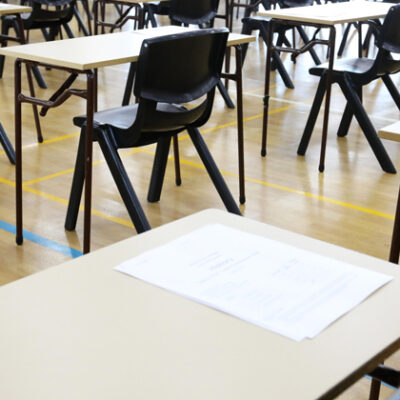Schools will be allowed to use fewer exam invigilators and also staff that teach the subject being examined under new guidance designed to alleviate anticipated disruption.
Guidance published by the Joint Council for Qualifications late last week has relaxed normal protocols after schools voiced concerns they would not be able to source enough invigilators.
It comes after the National Association of Examinations Officers revealed over four in five of 1,000 exam officers surveyed reported a shortage.
Here is what schools need to know:
1. Invigilator ratio expanded to 40:1 …
Under normal circumstances, exam centres are required to ensure at least one invigilator is present for each group of 30 or fewer pupils. For practical exams, the ratio is normally 20:1
However, schools will be allowed to use one invigilator for a group of up to 40 pupils during summer exams “where it is not possible for the centre to meet standard requirements”.

The threshold for practical exams has also been increased to 30:1.
JCQ states that in “exceptional cases”, where all other options have been exhausted, “the examination may continue with the invigilators that are available provided that the centre notifies the relevant awarding body on the day of the examination”.
The awarding body will then decide if the exam scripts can be accepted.
But if the exam centre is not confident the exam “can be conducted with integrity” due to a lack of invigilators, they are advised to consider delaying the exam until later that day or splitting the cohort into smaller groups.
2. … and subject teachers CAN invigilate
If no other suitable invigilators are available, subject teachers can invigilate an examination in their own subject.
This is normally prohibited, but will be allowed this summer as long as the teachers are briefed to be “particularly careful not to influence candidates’ responses”.
These teachers must not be the sole or lead invigilator for a group of pupils they have taught, the guidance adds.
Tom Middlehurst, assessment specialist at the Association of Schools and College Leaders, supported the changes but warned that “even with this in place, schools and colleges face a huge challenge in ensuring they have enough invigilators”.
“A lot of the uncertainty surrounding this summer’s exams could be eradicated if students and staff still had access to free testing and we have repeatedly asked the government to reintroduce this.”
3. Exams can start later, but must be on same day
Exam centres can normally vary an exam start time by up to 30 minutes.
This summer’s exams may start later as long as they take place on the timetabled date and pupils are supervised “from no later than 30 minutes after the published start time until the examination starts”.
In this scenario, the exam centre must notify the relevant awarding body on the day of the exam.
The guidance adds: “If groups of candidates are due to take the examination in different rooms, centres may start each group as soon as they are ready, provided that the remaining candidates remain under supervision.”
4. Prior approval required for remote invigilation
Remote invigilation may be permitted in “very exceptional cases”.
But JCQ warns that prior approval must be granted from the relevant awarding body and “will not be granted on the day of the examination”.

5. Alternative sites can split exam cohorts
Schools are are advised to follow existing alternative site guidance, which requires exam centres to submit a notification of intent six weeks before exams begin.
It is acknowledged this may not always be possible for a candidate in hospital or sitting an exam at home, but “late submission should be made as soon as the details are known”.
JCQ adds: “This process can also be used if it is necessary to split a cohort of candidates and relocate one group of candidates to an alternative site.”
6. Pupils unable to sit exams can get ‘calculated grade’
Where candidates cannot sit the exam within the centre or at an alternative site a “calculated grade”, known as an aegrotat, may be used to ensure they are not disadvantaged.
This scenario would occur when some exams in the qualification have already, or can be, completed, and centres must apply for special consideration in the normal way.
Where candidates cannot sit any exams, they should sit them in a later series, the guidance adds.
















Your thoughts